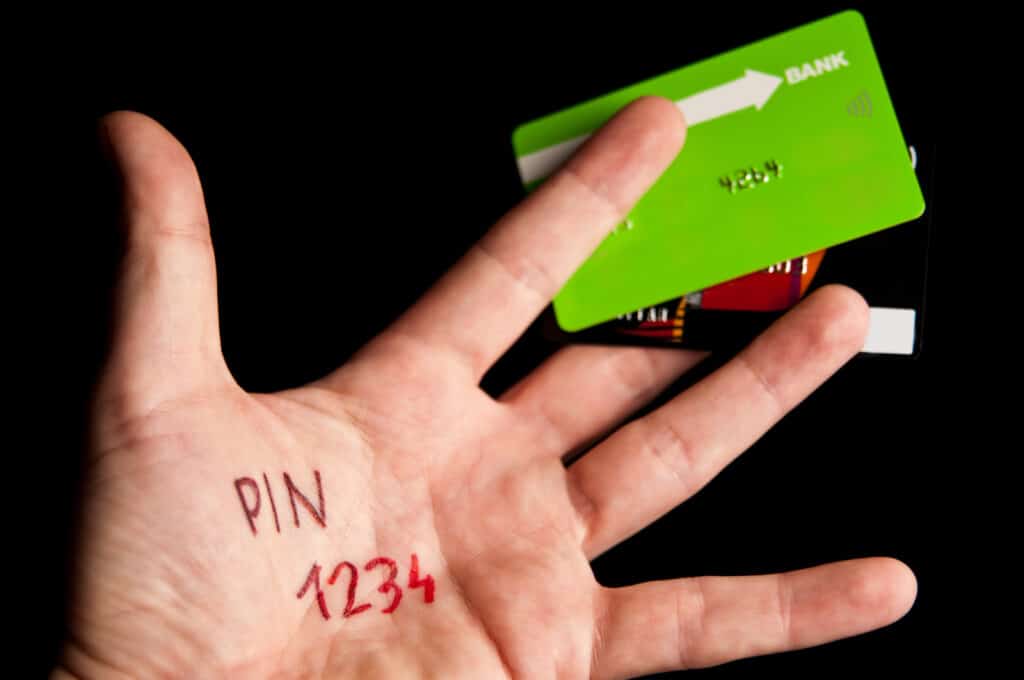Credit cards are becoming an increasingly popular payment method, as they offer convenience and security for both customers and merchants. But unlike debit cards, credit cards do not require the user to enter a personal identification number (PIN) when making a purchase. This begs the question: why don’t credit cards have pins?

In this blog article, we’ll explore the answer to this important question and discuss the implications of not having a PIN for credit cards. We’ll also look at other security measures that are often used in place of a PIN, such as chip-and-signature transactions, so you can feel comfortable about using your credit card for purchases. Let’s dive in and learn more about this intriguing issue.
Want to see your credit score for free and be able to use many financial tools right now? Just click here!
Definition of a Credit Card
A credit card is a payment method that allows individuals to pay for goods or services with pre-approved borrowing. It is issued by a financial institution and contains information about the cardholder, including name, address, and credit limit. Credit cards allow consumers the convenience of making purchases without having to carry cash or write checks.
They may also be used as an effective method of budgeting; users can track their spending throughout the month and pay off any balances at the end of their billing cycle. Because of its many advantages, credit cards have become one of the most popular methods of payment today.
Click Here to Check Your Credit Score for Free!
Reasons for the Lack of PINs on Credit Cards
The use of personal identification numbers (PINs) for credit cards is relatively uncommon in the United States, but it is gaining popularity in other parts of the world. This lack of usage is primarily due to the convenience associated with signature-based transactions, as well as the costs associated with issuing PIN-enabled cards. Furthermore, many people feel reluctant to store another piece of sensitive information (their pin number) when they already have to remember dozens of passwords and account usernames.
The banking industry has recognized this trend and is working closely with card issuers to develop new technologies that address these concerns while still providing an extra layer of security for consumers. Ultimately, PINs will likely become more commonplace in the near future as card issuers continue to roll out these advanced options.
Pros of Not Having to Use PINs
Credit cards are an essential tool in modern day life and can be used for a variety of purposes. One great advantage credit cards present is not having to remember PINs. Instead of needing to remember another password or pin code, credit card transactions are simple; you either provide a signature or use biometrics such as a fingerprint. This ensures that credit card transactions are secure and, more importantly, fast and easy.
Not having to use pins also removes the worry of forgetting the pin and being stuck without access to your account. Ultimately, credit cards are one of the most convenient and time-saving way to make payments without any hassle.
Increased Security and Fraud Protection
Improved credit card security and increased fraud protection is paramount for any business or organization that depends on credit cards for transactions. In today’s highly connected world, cardholders expect their credit card information to be safe and secure from hackers, scammers, and other malicious actors. Businesses must take steps to ensure credit card data is encrypted, and implement technologies such as two factor authentication and multi language passwords to help protect against credit fraud.
Additionally, monitoring credit reports regularly can be a powerful tool in the fight against fraud. By utilizing these measures businesses are helping to create a secure environment where customers can transact safely with confidence.
Easier Shopping & Convenience

Shopping has never been easier than it is today. With credit cards, consumers can make purchases anywhere and anytime without having to worry about carrying cash around with them. Not only does paying by credit card provide users with convenient access to make purchases, but credit cards also help in tracking budgeting through itemized statements.
Credit cards bring an ease to the shopping experience that was not possible in the past while also providing a secure form of payment.
Cons of Not Having to Use PINs
There are some obvious cons of not having to use PINs to validate credit card purchases. For starters, there may be an increased risk for credit card fraud, since relying solely on the credit card owner’s signature increases the possibility that an unauthorized person can use the credit card. That is why it is important for credit card holders to be vigilant when carrying their cards with them, and also to make sure that credit cards are kept out of sight when making a purchase.
Not having to use PINs can also require additional time for credit card transactions, as relying on signatures may slow down processing times. On top of this, not utilizing PINs may lead to transaction errors due in part to potential discrepancies between signatures written on paper receipts and existing records on file.
Increased Chance of Unauthorized Purchases
With credit cards becoming more and more accessible, it’s critical to take steps to prevent unauthorized purchases. While it can be tempting to freely hand out credit cards to family and friends, there is an increased chance of purchases being made without your knowledge or approval. It’s important to start implementing tight security measures and strict spending limits in order to guard against any potential security risks or misuse of credit cards.
Lastly, don’t forget to check credit card statements regularly for suspicious charges, so you can quickly identify any discrepancies and take the proper steps to protect yourself from fraud or government credit laws violations exceeding spending limits.
Lower Level of Security for Some Transactions
Systems providing lower levels of security for credit card transactions can help facilitate a faster and smoother purchasing process, allowing users to make quick purchases without the need for extensive verification or authentication. This could be beneficial in certain circumstances, such as when buying digital goods or services that require immediate attention due to their limited availability or lifespan. By reducing transaction security requirements, businesses can offer instantaneous payment options that offer consumers more flexible and immediate access to goods and services.
Click Here to Buy Stocks and Crypto on eToro!
Although credit cards used in such transactions still retain strong protections from fraudulent activities and unauthorized purchases, the ability to forego elaborate verification procedures increases usability among customers who demand expedited service.
Conclusion
In conclusion, credit cards have become an invaluable tool in the modern world – they provide a convenient and secure way to make purchases, but there are some drawbacks that should be taken into consideration. Fraud is always a risk when using credit cards, so it is important for users to understand how to keep their accounts secure by closely monitoring transactions and setting spending limits.
Additionally, opting out of using PINs for some transactions can lead to transaction errors and an increased risk for unauthorized purchases. By following these safety measures, credit card users can make the most of their accounts without any added worry or stress.
